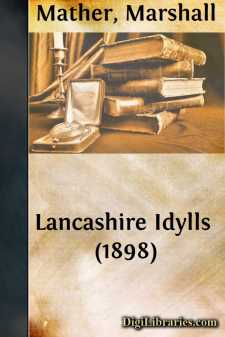Categories
- Antiques & Collectibles 13
- Architecture 36
- Art 48
- Bibles 22
- Biography & Autobiography 813
- Body, Mind & Spirit 142
- Business & Economics 28
- Children's Books 15
- Children's Fiction 12
- Computers 4
- Cooking 94
- Crafts & Hobbies 4
- Drama 346
- Education 46
- Family & Relationships 57
- Fiction 11829
- Games 19
- Gardening 17
- Health & Fitness 34
- History 1377
- House & Home 1
- Humor 147
- Juvenile Fiction 1873
- Juvenile Nonfiction 202
- Language Arts & Disciplines 88
- Law 16
- Literary Collections 686
- Literary Criticism 179
- Mathematics 13
- Medical 41
- Music 40
- Nature 179
- Non-Classifiable 1768
- Performing Arts 7
- Periodicals 1453
- Philosophy 64
- Photography 2
- Poetry 896
- Political Science 203
- Psychology 42
- Reference 154
- Religion 513
- Science 126
- Self-Help 84
- Social Science 81
- Sports & Recreation 34
- Study Aids 3
- Technology & Engineering 59
- Transportation 23
- Travel 463
- True Crime 29
Lancashire Idylls (1898)
by: Marshall Mather
Categories:
Description:
Excerpt
I.
There was a sepulchral tone in the voice, and well there might be, for it was a voice from the grave. Floating on the damp autumnal air, and echoing round the forest of tombs, it died away over the moors, on the edge of which the old God's-acre stood.
Though far from melodious, it was distinct enough to convey to the ear the words of a well-known hymn—a hymn sung in jerky fragments, the concluding syllable always rising and ending with a gasp, as though the singer found his task too heavy, and was bound to pause for breath.
The startled listener was none other than Mr. Penrose, the newly-appointed minister, who was awaiting a funeral, long overdue. Looking round, his already pale face became a shade paler as he saw no living form, other than himself.
There he stood, alone, a stranger in this moorland haunt, amid falling shadows and rounding gloom, mocked by the mute records and stony memorials of the dead.
Again the voice was heard—another hymn, and to a tune as old as the mossed headstones that threw around their lengthening shadows.
‘I'll praise my Maker—while I've breath,’followed by a pause, as though breath had actually forsaken the body of the singer. But in a moment or two the strain continued:
‘And when my voice—is lost in death.’Whereon the sounds ceased, and there came a final silence, death seeming to take the singer at his word.
As Mr. Penrose looked in the direction from which the voice travelled, he saw a shovel thrown out of a newly-made grave, followed by the steaming head and weather-worn face of old Joseph, the sexton, all aglow with the combined task of grave-digging and singing.
‘Why, Joseph, is it you? I couldn't tell where the sound came from. It seems, after all, the grave can praise God, although the prophet tells us it cannot. Do you always sing at your work?’
‘Partly whod. You see it's i' this way, sir,’ said Joseph; ‘grave-diggin's hard wark, and if a felley doesn'd sing a bit o'er it he's like baan to curse, so I sings to stop swears. There's a fearful deal o' oaths spilt in a grave while it's i' th' makin', I can tell yo'; and th' Almeety's name is spoken more daan i' th' hoile than it is up aboon, for all th' parson reads it so mich aat of his book. But this funeral's baan to be lat', Mr. Penrose’; and drawing a huge watch from his fob, he exclaimed: ‘Another ten minutes and there's no berryin' i' th' yard this afternoon.’
‘I don't understand you, Joseph,’ said Mr. Penrose wonderingly.
‘We never berry here after four o'clock.’
‘But there's no law forbidding a funeral at any hour that I know of—is there?’
‘There is wi' me. I'm maisther o' this berryin' hoile, whatever yo' may be o' th' chapel. But they're comin', so I'll oppen th' chapel durs.’
Old Joseph, as he was called, had been grave-digger at Rehoboth for upwards of fifty years, and so rooted were his customs that none cared to call them in question. For minister and deacons he showed little respect....


